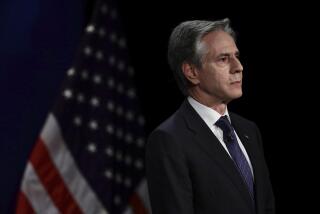Georgia Frees Russian Officers
- Share via
MOSCOW — Six Russian military officers accused by Georgia of espionage were allowed to return to Moscow on Monday, as Georgian authorities tried to defuse a diplomatic crisis with their northern neighbor.
Even so, Russia said it would ban most direct transportation between the two countries and suspend postal service. Officials said the actions were in response to unpaid debts and safety violations and were not retaliation for the arrests last week of four of the military officers.
It appeared the measures would take effect despite the decision by Georgia to release the four men and to grant two others safe passage out of the country.
Russian television showed the four military officers, still in handcuffs, being released in the Georgian capital, Tbilisi, into the custody of the Organization for Security and Cooperation in Europe. All six were greeted Monday evening at a military airport outside Moscow by Russian Defense Minister Sergei B. Ivanov.
Russian President Vladimir V. Putin spoke by telephone with President Bush about the incident, the Kremlin said.
Putin warned against any actions by countries “that Georgia’s leadership could interpret as encouraging its destructive policy,” the Kremlin said after the Putin-Bush conversation.
Relations between the two former Soviet republics have deteriorated since the 2004 election of pro-Western Georgian President Mikheil Saakashvili, who came to power after a nonviolent revolt dubbed the Rose Revolution.
The growing tension has raised concerns about the risk of a military clash between the two countries.
Saakashvili, in a news conference in Tbilisi, played down Moscow’s bans on travel and postal service, the Russian news agency RIA Novosti reported.
“We are not a country that can be so easily scared,” Saakashvili said.
He also appeared to hold out an olive branch, describing the two countries as “historical partners.”
Saakashvili said the root cause of troubles between Georgia and Russia was Moscow’s refusal to fully recognize Georgia’s independence.
“Problems between Georgia and Russia will end after Russia accepts us as we are,” he said. “We do not want the Russian military, but we want Russian tourists. We do not want Russian spies, but we want Russian business.”
Russia maintains two Soviet-era military bases in Georgia, which it has promised to close by 2008. It also has troops on peacekeeping duty in two breakaway Georgian regions, Abkhazia and South Ossetia.
Tbilisi’s efforts to recover control of the breakaway regions and Moscow’s support for the separatist governments have contributed to the worsening relations.
Saakashvili has made it a top goal of his administration to bring Georgia into the North Atlantic Treaty Organization, a turn away from Moscow that has angered Putin.
European Union diplomat Javier Solana issued a statement praising Georgia’s decision to release the Russian military officers.
“I hope normal relations can now be reestablished between Russia and Georgia,” Solana said. “The European Union stands ready to facilitate contacts between the two sides and to support further confidence-building measures.”
Viktor Kremenyuk, deputy director of the USA-Canada Institute, a Moscow think tank, said Moscow had played into Saakashvili’s hands by responding with what he called “blunt, inappropriate pressure ... bordering on blackmail.”
“The Kremlin demonstrates that it still treats its former republics as if the world is still back in the early 1990s, and as if there is no way to go but back into the Kremlin’s embrace,” he said.
But Sergei Mironov, speaker of the Russian upper house of parliament, said in televised comments that Russia would retaliate against countries that offended it.
“Russia is a great state,” Mironov said. “We don’t intend to forgive spitting in our direction. Simply speaking, if somebody doesn’t have wits and is trying to play on emotions, we will be sobering them up with very simple and affordable methods that everyone will be able to understand.”
*
Times staff writer Sergei L. Loiko contributed to this report.
More to Read
Sign up for Essential California
The most important California stories and recommendations in your inbox every morning.
You may occasionally receive promotional content from the Los Angeles Times.










